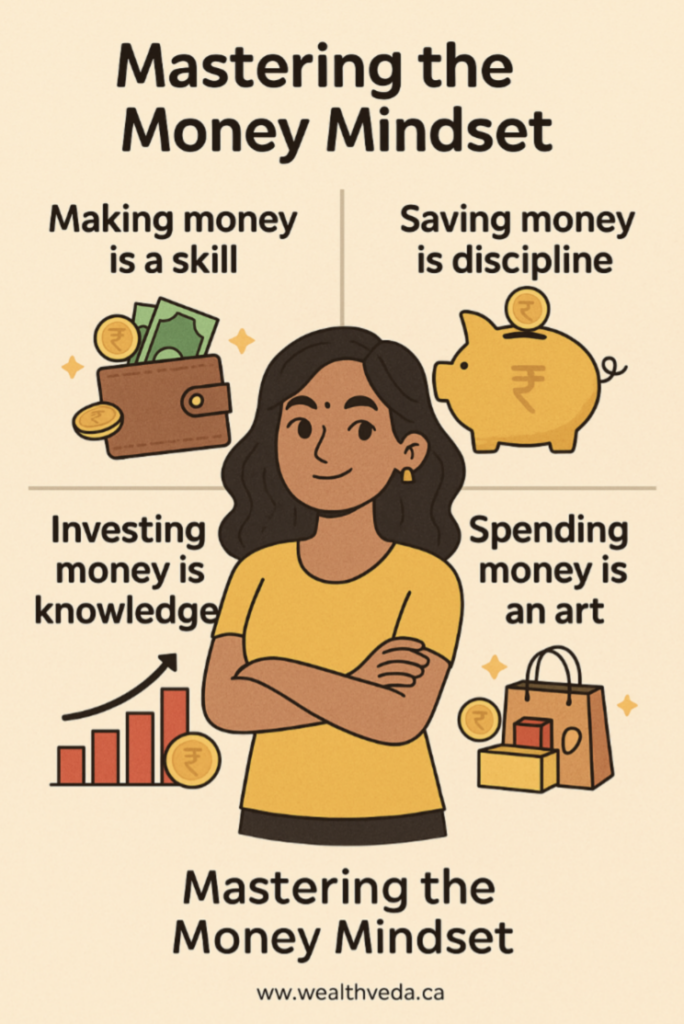Mastering the Money Mindset: The Art of Earning, Saving, Investing & Spending

Ever wondered why some people seem to have it all together financially while the rest of us are still confused if Swiggy dinner is a necessity or a luxury? Welcome to Wealth Veda, where we decode the riddle of rupees and sprinkle some laughter along the way.
Let’s break it down.
Making Money is a Skill
Earning money isn’t just about degrees — it’s a skill built through consistent effort, just like the 10,000-hour rule made popular in Outliers by Malcolm Gladwell.
How to Build This Skill:
- Figure out what you’re naturally good at (yes, even your dramatic Insta rants can be monetized now).
- Learn high-value skills — coding, content writing, design, healthcare, engineering. It’s not always about how much you earn; it’s about how much you keep. A family earning $1 million a year might still be broke if they spend $1.1 million — taxes alone could take away $400–500K. In contrast, a family earning $150K and saving $20K annually is actually doing better. Who’s richer? The answer might surprise you.
- Monetize your passions — baking, mehendi, or tutoring can all pay.
- Explore freelancing, teaching, or selling digital products.
Pro Tip: Don’t underestimate yourself. Someone built a million-dollar brand reviewing toys on YouTube — shoutout to Ryan’s World!
Saving Money is Discipline
Saving money is like promising to eat healthy — easier said than done!
Why is Saving Hard?
- Instant rewards feel great (that midnight chocolate cake delivery hits differently).
- That desi urge whispers, “Bas le lo, it’s on sale!”
- But here’s a reminder — frugality runs deep in our culture. You just have to channel it and stop trying to impress people who aren’t paying your bills.
How to Make It Easier:
- Automate your savings so they happen without you thinking.
- Use budgeting apps to track expenses.
- Stick to the 50-30-20 rule: Needs, Wants, Savings.
Quick Fix: Begin with saving ₹500/month. That’s it. As James Clear wrote in Atomic Habits, habits form with small, consistent actions. Let your saving muscle flex!
Investing Money is Knowledge
Investing isn’t just for finance bros in suits. It’s for everyone — including your dadi, who’s probably smarter than half the market with her gut instinct! Book suggestion – The Wealthy Barber by David Chilton or Beat the bank by Larry Bates.
Why Should You Invest?
- To keep up with inflation (cash under the mattress is not a growth strategy).
- To create long-term wealth.
- To take advantage of compounding — your money making more money, effortlessly.
Where to Start:
- Begin with the basics: Mutual Funds, SIPs, Index Funds.
- Use user-friendly platforms like Groww, Zerodha (India) or Wealthsimple, Questrade (Canada).
- Watch trusted YouTubers — 10 minutes a day can build your knowledge base.
Just verify the sources. If someone says you’ll double your money in 10 days, it’s time to ghost them.
Golden Rule: If it sounds too good to be true, it probably is. Stick to creators with real, long-term advice — I personally follow Ankur Warikoo, Dave Ramsey, and Ramit Sethi.
Spending Money is an Art
Smart spending isn’t about saying no to everything — it’s about saying yes to what truly matters.
Mindful Spending Tips:
One underrated superpower? Tracking your spending. Start with a simple Excel sheet or even paper. I’ve been doing this for 15+ years — just 5 hours a month — and it’s a game-changer. You’ll know exactly how much you earn, spend, and invest. It makes your goals clearer — whether you’re saving for student loans, a wedding, kids’ education, or retirement. If you don’t know where your money goes each month, this is your starting point. After reviewing 3–6 months of spending, you’ll naturally delay big purchases and set realistic budgets for travel, fun, and entertainment.
- Create a budget — Netflix, subscriptions, and daily coffees sneak up on you.
- Separate needs from wants — that 70% off bag still counts as a “want.”
- Try the 7-day wait rule — if you still want it after a week, go for it.
Emotional Tip: Spend more on memories than materials. Thoughtful travel, shared experiences, and family adventures often bring more joy than expensive gifts. Plan your vacations with intention — whether it’s hikes, museums, or beach sunsets, memories stay, credit card bills don’t.
The Real Balance — All Four Together
A financially fit life is not built on one pillar — it needs all four:
- Earn smart — work with purpose, not just hours.
- Save steadily — consistently, not occasionally.
- Invest mindfully — grow wealth with patience.
- Spend wisely — align money with values.
True wealth is about balance — not just digits in your bank account but peace in your mind.
And here’s a reality check: If you never enjoy your money, what’s the point? Don’t live your whole life storing it for the next generation. Whether you leave behind ₹1 crore or ₹100 crore — it’ll never feel like “enough.” What matters is building a life that’s rich in joy, not just numbers.
Final Thoughts — What’s Your Money Story?
Are you a saver, a spender, a budding investor, or a side-hustle superstar?
Whatever your money personality — that’s your launchpad.
Take just one intentional step today. Your future self (vacationing EMI-free with a smoothie in hand or retiring 10 years sooner ) will be proud.